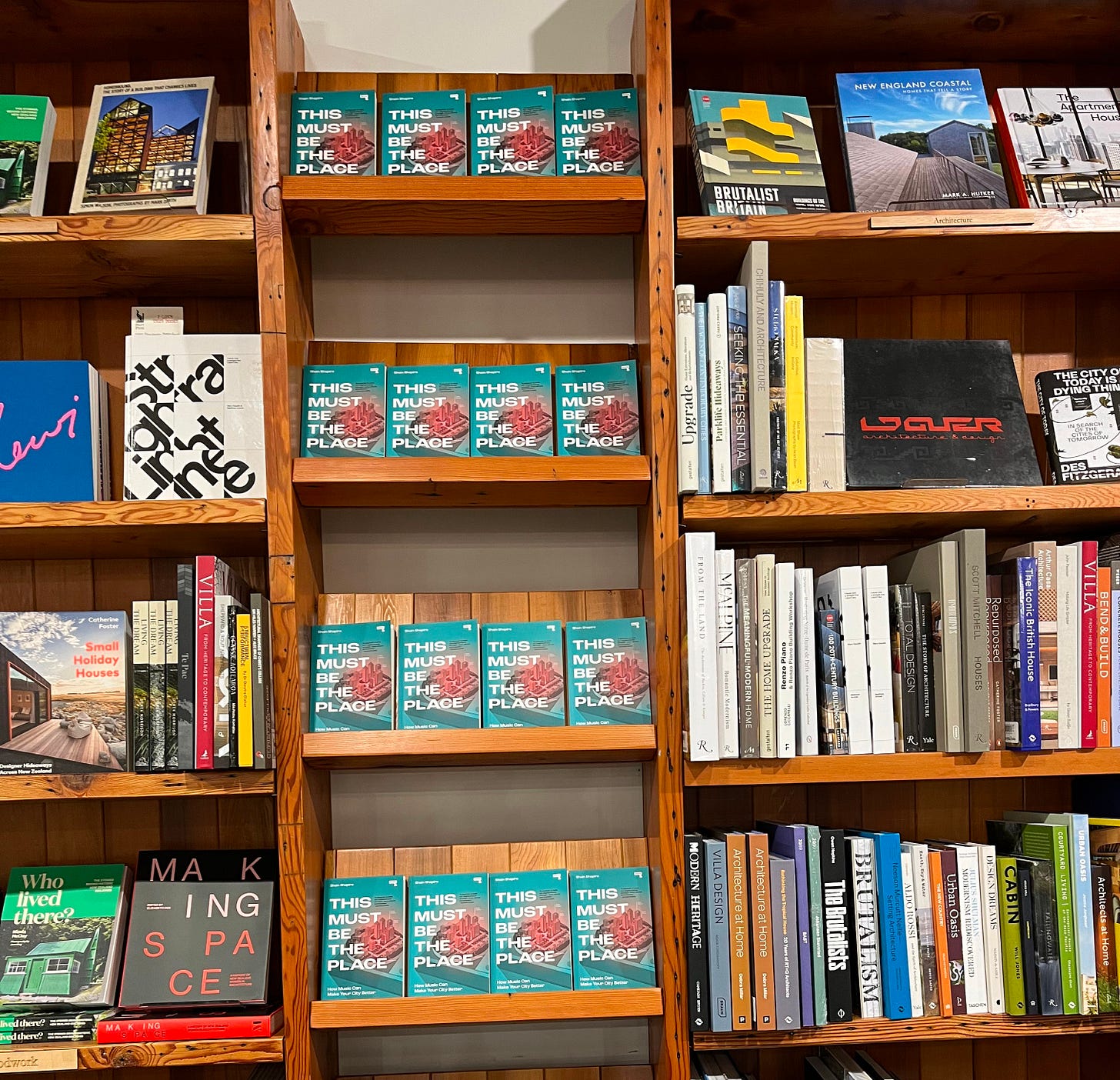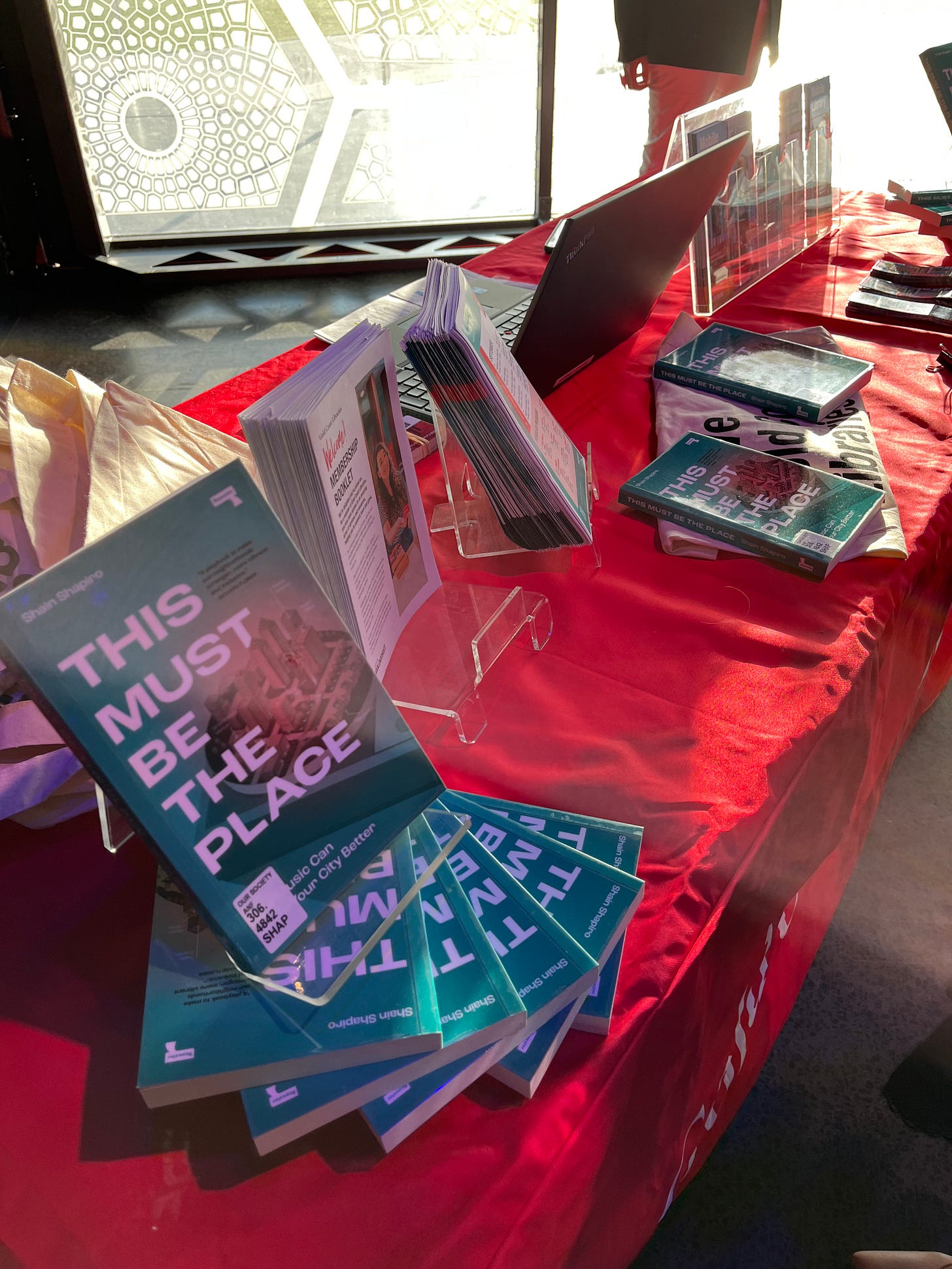I have been on the road since August 21st. Here’s the itinerary:
London - Auckland - Christchurch - Wellington - Auckland - Brisbane - Gold Coast - Melbourne - Sydney - Wollongong - Sydney - Singapore - Tokyo - London. I’m writing to you from Singapore today, where I will visit Epigram Books in the Singapore Art Museum this afternoon.
It has been 12 months (and five days) since the book came out. When I wrote it, I decided to treat the book ‘like a band’ and do as much as possible in as many places as possible. Tokyo will be the 60th public performance since September 7th, 2023. Each has featured 3-4 local speakers, meaning I’ve had around 200 people join me on stage - each talking about why they love, invest in, and care about the music ecosystem where they live. It has been uplifting, if not exhausting and time consuming. There are a lot of people to thank along the way - my teams at Sound Diplomacy and the Center for Music Ecosystems for their consistent and brilliant work when I’m away, my publishers (Repeater Books) for getting the books into shops and independent book stores, theatres, city councils, bars, libraries, art galleries, music venues, outdoor stages, festivals and move theatres for hosting me, and to you - for reading, commenting, engaging, attending, participating. Having done, in effect, a show every 4-5 days makes one reflective.
I will write a few posts over the next few months outlining what I’ve learned along the way and trying to highlight some of the cities and places that are investing in music every day to improve their communities.
Here are a few learnings from the past few weeks.
Australia and New Zealand are leading the local live music action plan movement. The number of local communities—small towns, municipalities within big cities, and mid-sized cities—developing live music action plans, precincts, and entertainment districts across New Zealand and Australia is staggering. Here are some, for example. This is encouraging.
Parramatta, New South Wales (in Greater Sydney)
St. Kilda, Victoria (in Greater Melbourne)
However, many places are not recognizing or capturing the full breadth of their music ecosystem because of a heightened focus on live music. Live music has undergone extensive challenges since the pandemic, so, understandably, much of the effort in local government is dedicated to that. However, I did notice conversations and opportunities related to education, healthcare, well-being, reconciliation, or climate action were less prevalent than preserving live music venues. This is all an ecosystem; it is interlinked, but the sense was that most music strategy pursuits were focused on venues.
Good policy takes time to trickle down: New South Wales is the first government - state or national - with a Minister for Music and the Night Time Economy (John Graham). This is an incredible achievement that took a decade of work. Alongside, New South Wales has consistently reformed a number of regulations related to music and the night time economy, as well as created new state offices for music (Sound NSW) and the night-time economy (Office of the 24-Hour Commissioner). I was lucky to feature both heads of these organizations at my book talk in Sydney and spend time with Minister Graham and the number of folks responsible for the regulatory reforms, including Live Music Office consultant John Wardle and APRA-AMCOS CEO Dean Ormston. And what is clear is that this is generational work. Reforms being implemented - and adhered to - on the ground in every community takes time. However, the leadership the state is showing (and the AUD 100m+ budget assigned to this brief) deserves to be recognized.
Internally, our lobbying continues to improve: I spent some time with the Auckland City of Music team and Independent Music Venues New Zealand. New Zealand is transitioning as a new conservative government proposes an austerity platform (I wrote about it here). While there is worry that this will reduce resources, I appreciated the grassroots organizing I saw in New Zealand, led by the venue lobby. They are contributing briefs to district plans (see this one in Wellington) and are well-placed to influence government as these priorities are debated positively. This would not have been the case before the pandemic and while there’s a long way to go, we need to appreciate how far we’ve come. Being in New Zealand outlined that for me.
Still, we continue to let our own visions of what ‘music is’ cloud our ability to advocate effectively: In most cities I visited, I spoke to passionate, welcoming people who are all well concerned with protecting, preserving, or investing in their version of their local music ecosystem. I continue to struggle with coming to terms with who is not at my events and who I’m not talking to: the majority of folks who I was able to reach were white and middle-aged. I struggled to attract younger or diverse audiences (my book talks are for all ages). It’s given me a lot of pause and something I’m reflecting on. I have to ‘check my assumptions’ every day and think intentionally about who I am advocating for and who I am unintentionally leaving out. All of my shows were incredible, but I think they did not reflect the breadth of the community in each city. And that’s something I have to improve upon.
I can only be in one place at one time: As I write this, I have friends and colleagues preparing for the United Nations General Assembly and UN Climate Week in NYC, as well as the negotiations around the Summit and Pact for the Future (a document that we should all know about). It’s also the Reeperbahn Festival in Germany (where the Center for Music Ecosystems presents seven speakers) and SXSW Sydney. There are a lot of places I wish I could be. But I’ve realized I need to appreciate where I am—every day. This trip has been a once-in-a-lifetime affair, I think. I’ll never forget it.
Thanks for reading. More soon.







